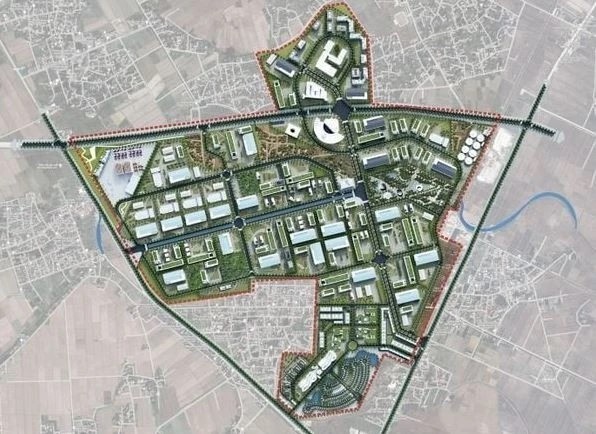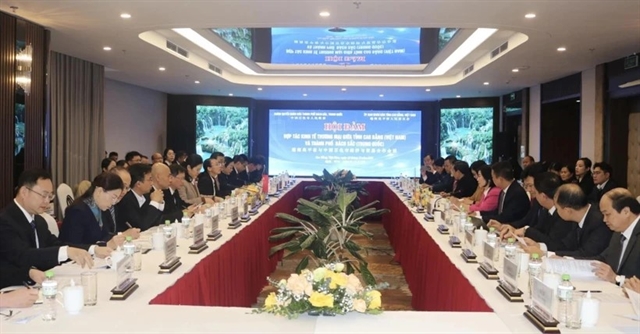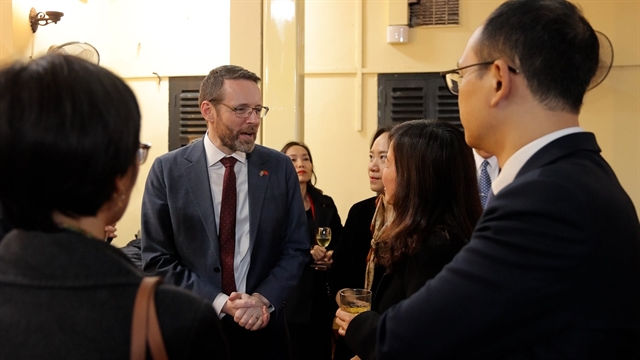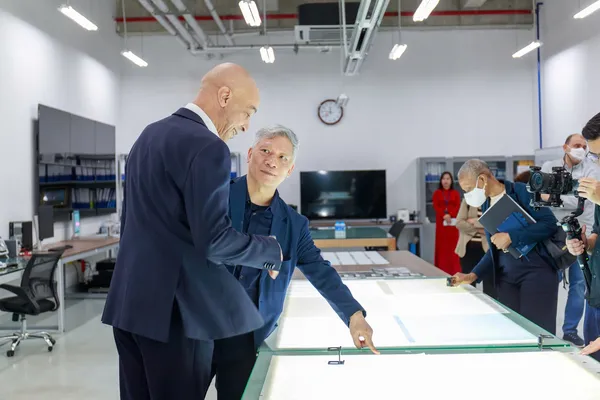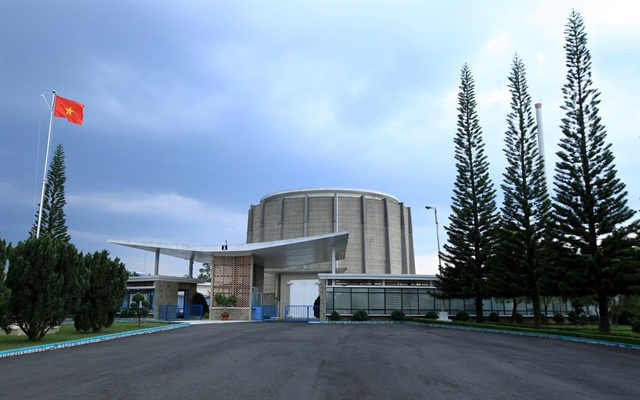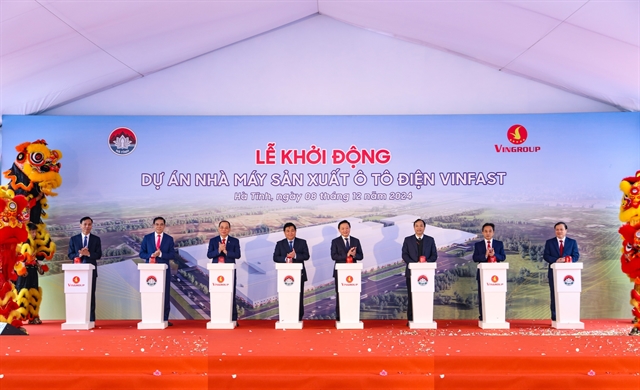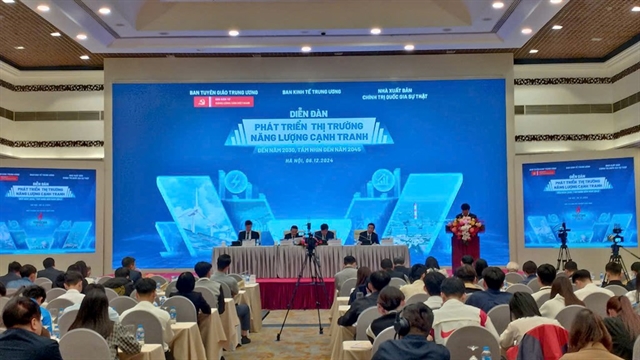

As humans destroy forests and other places where wild animals live, those creatures are dying out. Many types of animals have already gone now forever and many more are on their way to becoming extinct. Luckily for some animals, there are people who work very hard to save them.
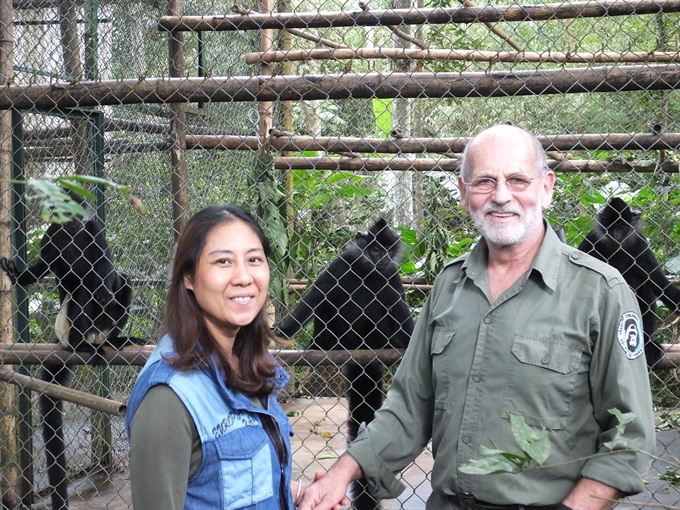 |
| In the family: Hiền (left) and Tilo have nurtured their happiness at the centre. Photo courtesy of the family |
As humans destroy forests and other places where wild animals live, those creatures are dying out.
Many types of animals have already gone now forever and many more are on their way to becoming extinct.
Luckily for some animals, there are people who work very hard to save them.
Two such people are Nguyễn Thị Thu Hiền and Tilo Nadler who work with animals in the Cúc Phương National Park.
By Lê Hương & Hồng Vân
A bright morning and the sun sends fragile rays through layers of leaves in Cúc Phương National Park in the northern province of Ninh Bình.
The twittering of birds and chattering monkeys is a natural alarm for staff at the Endangered Primate Rescue Centre (EPRC).
Two attendants slowly walk on the path between the trees and cages of primates that need special cares. They talk about the monkeys they put geographical positioning rings on yesterday. They will release them back into the wild in few days.
For the past 20 years, Nguyễn Thị Thu Hiền and Tilo Nadler have enjoyed the start of each day walking round the centre.
Nadler first went to Cúc Phương in 1991 to make a report for German TV on Delacour’s langur – one of the world’s rarest primates, which was discovered by a French expedition in 1930, based on two skins from a local hunter.
After more than 50 years without any information about this primate, in 1987 the first living individuals were seen in the national park. Nadler sent a project proposal to Frankfurt Zoological Society for conservation work and research.
In January 1993, he started the primate centre in Cúc Phương. It was the first in Indochina.
“The first goal of the centre was to provide housing for trapped or injured primates,” he said, “This work not only help the animals, but supports the work of rangers and forest protection authorities through the whole country.”
Nadler said the knowledge about the status of many primate species in the early days was poor, the numbers of the rarest species over-estimated and the problems and survival of populations in the wild completely under-estimated.
“It was often very difficult to convince forest protection authorities and police to support conservation activities,” he said, “With correct and stricter law enforcement, the numbers of confiscations increase, requiring us to intensify fund-raising activities abroad and to hire more staff.
“With better knowledge, we recognised that several species were already on the brink of extinction. Therefore the goal of the centre concentrated not only on rescuing monkeys, but building a breeding centre to re-introduce animals back into the wild to bolster depleted wild populations or to establish a new population where they had been wiped out,” he said.
The centre runs a successful breeding programmes for some of the world’s rarest primate species – the Cát Bà langur, Delacour’s langur, Grey-shanked douc langur, Hatinh langur and other highly endangered species. It now keeps 15 Vietnamese primate species, six of them survive only at the centre.
More than 200 primates have been born at the centre and reintroduction programmes carried out for Delacour’s and Hà Tĩnh langurs, Pygmy and Slow lorises.
The centre also carries out education programme and research activities. More than 20 Master and PhD theses are produced in co-operation with universities in Việt Nam and abroad. This has led to the publication of more than 100 scientific papers.
Nadler has not only found success in preserving primates, he found his family in Việt Nam as well.
With Hiền, his assistant at the beginning of the project, Nadler has set up a happy family and now has two sons.
Yet their marriage has not been as easy as running the centre due to the 31-year-gap in their ages.
“My parents and relatives did not agree until my father retired and my relatives found a letter written by my grandfather predicting that I would get married to a foreigner,” Hiền said.
In the year 2,000, they married in a simple ceremony in Dresden, Germany, following an engagement ceremony in Việt Nam.
"My two sons love painting," she said. "It is a talent inherited from their father’s family. They also enjoy studying nature.
“On our holidays, we often visit forests and parks in Việt Nam, Thailand and other neighbouring countries to explore nature,” she said.
Since 2016, Nadler and Hiền have gradually transferred part of their tasks to other colleagues at the centre.
The centre now has 28 staff, a communications specialist, a volunteer co-ordinator, a foreign head keeper and one director. The main financial sources are from international organisations and zoos.
“The difference between conservation work in Germany and Việt Nam is that in Germany it is funded by the government and national donors, such as companies and institutions,” said Nadler, “While in Việt Nam, the biggest financial source for conservation work in Việt Nam comes from abroad.
The director of the centre, Sonya Prosser, said she thought Nadler had achieved a lot. “Without his work, the Delacours langur would most probably be extinct. He had the foresight to breed the animals he rescued, where most rescue centres do not.
“This work is important for these species as it provides biologists with opportunities to study to animals, which better equips them for conserving the animals.
“It also creates a population for re-introduction into empty areas. I think the centre, under Nadler’s management provided a great source of data for researchers in many fields over its 23 years of operation,” she said.
She believes now is the time for Vietnamese people to feel a sense of ownership of the EPRC.
“Nadler has been caring for it, but it’s time for the Vietnamese people to own it,” she said, “This means taking responsibilities for what is happening to local wildlife.”
Prosser suggested the centre generate its own running costs. Leipzig Zoo is a great support, financially - and also in attempting to reach a similar vision.
“If the centre can cover its own running costs, then all additional donations or support can go directly towards education, research, re-introduction programmes. Current staff will be given opportunities to develop a career path if they desire, which in turn will grow the centre’s capacity.” — VNS
A bright morning and the sun sends fragile rays through layers of leaves in Cúc Phương National Park in the northern province of Ninh Bình.
If something is fragile it can break easily.
Two attendants slowly walk on the path between the trees and cages of primates that need special cares.
Primates are creatures with hands and feet as well as well-developed brains. Humans, chimpanzees, monkeys, lemurs and gorillas are all primates.
They talk about the monkeys they put geographical positioning rings on yesterday.
Geological positioning rings are rings that are attached to creatures that scientists study, which give off a signal that make it possible for the scientist to see where they are.
Nadler first went to Cúc Phương in 1991 to make a report for German TV on Delacour’s langur – one of the world’s rarest primates, which was discovered by a French expedition in 1930, based on two skins from a local hunter.
If something, like the Delacour’s langur is rare, there are not many of them. If they are the rarest primate, there are fewer of them than there are of any other primate.
Nadler sent a project proposal to Frankfurt Zoological Society for conservation work and research.
A proposal is an idea that is put forward to someone in the hope that they will do something about it.
Conservation means keeping things, such as natural resources, alive and well and not killing them to the point that they no longer exist.
Nadler said the knowledge about the status of many primate species in the early days was poor, the numbers of the rarest species over-estimated and the problems and survival of populations in the wild completely under-estimated.
The status of a creature is its situation in terms of how many there are around, how comfortable it is in its environment and so on.
When you under-estimate something, you do not think it is as strong as it actually is.
“It was often very difficult to convince forest protection authorities and police to support conservation activities,” he said, “With correct and stricter law enforcement, the numbers of confiscations increase, requiring us to intensify fund-raising activities abroad and to hire more staff.
To convince somebody of something means to get them to think about it in the way you would want them to think about it.
When confiscations happen, things people have that they are not supposed to have are taken away from them.
To intensify fund-raising means to do more of it and work harder at it.
“With better knowledge, we recognised that several species were already on the brink of extinction.”
If an animal is on the brink of extinction it is very close to becoming extinct, which means there will be none of its kind left and it will be gone forever.
“Therefore the goal of the centre concentrated not only on rescuing monkeys, but building a breeding centre to re-introduce animals back into the wild to bolster depleted wild populations or to establish a new population where they had been wiped out,” he said.
Concentrated means focussed
To bolster means to support.
Depleted populations are numbers of animals that have gone down.
More than 200 primates have been born at the centre and reintroduction programmes carried out for Delacour’s and Hà Tĩnh langurs, Pygmy and Slow lorises.
When animals are reintroduced to the wild they are taken from captivity to once again live in the wild where they once came from.
Nadler has not only found success in preserving primates, he found his family in Việt Nam as well.
Preserving primates means keeping them alive.
“My parents and relatives did not agree until my father retired and my relatives found a letter written by my grandfather predicting that I would get married to a foreigner,” Hiền said.
To predict means to say what will happen sometime in the future.
In the year 2,000, they married in a simple ceremony in Dresden, Germany, following an engagement ceremony in Việt Nam.
An engagement is a statement that says two people wish to get married.
"It is a talent inherited from their father’s family. They also enjoy studying nature.
A talent is a natural skill.
Things that people inherit are characteristics and possessions handed down from previous generations, such as their parents, grandparents and so on.
Since 2016, Nadler and Hiền have gradually transferred part of their tasks to other colleagues at the centre.
To transfer something means to send it from one place to another place.
Tasks are jobs and duties.
The centre now has 28 staff, a communications specialist, a volunteer co-ordinator, a foreign head keeper and one director.
A communications specialist is someone with skills to get messages across from one person to another.
A volunteer is someone who works willingly for no pay. A volunteer co-ordinator is someone who organises volunteers.
The main financial sources are from international organisations and zoos.
Financial sources are places where money come from.
“The difference between conservation work in Germany and Việt Nam is that in Germany it is funded by the government and national donors, such as companies and institutions,” said Nadler, “While in Việt Nam, the biggest financial source for conservation work in Việt Nam comes from abroad.
Donors are people who give.
He had the foresight to breed the animals he rescued, where most rescue centres do not.
To have foresight means to see and think about what will happen in the future.
When creatures breed, they have babies.
“This work is important for these species as it provides biologists with opportunities to study to animals, which better equips them for conserving the animals.
A species is a type of animal.
“I think the centre, under Nadler’s management provided a great source of data for researchers in many fields over its 23 years of operation,” she said.
Data means information that is collected.
“Nadler has been caring for it, but it’s time for the Vietnamese people to own it,” she said, “This means taking responsibilities for what is happening to local wildlife.”
Taking responsibility for something means accepting that it is your duty.
WORKSHEET
State whether the following sentences are true, or false:
© Duncan Guy/Learn the News/ Viet Nam News 2018

